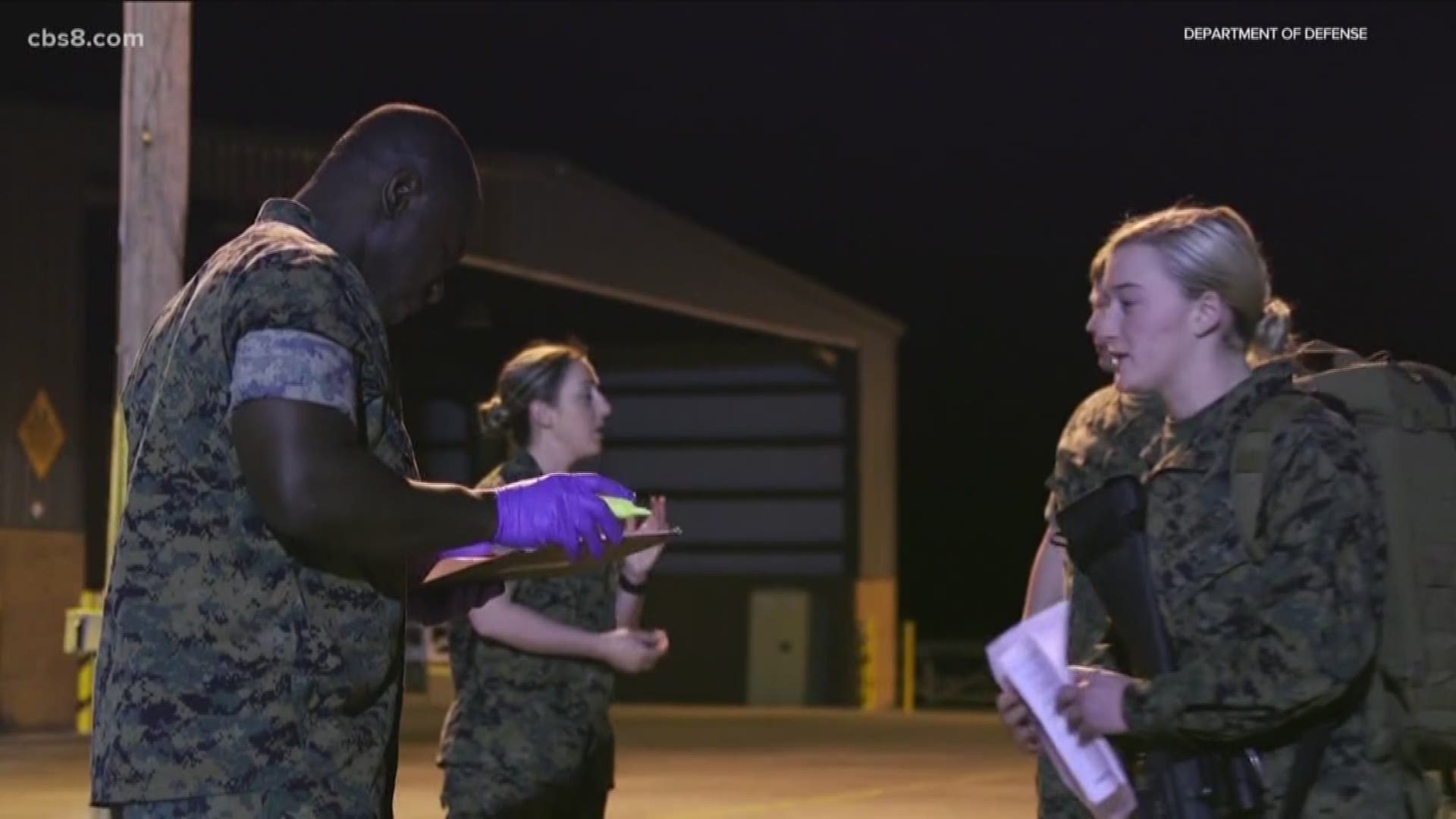SAN DIEGO — The U.S. Marines adjusted to comply with the latest coronavirus guidelines. Over the weekend, the Centers for Disease Control recommended the use of masks when performing essential duties. While the Marines have made adjustments to encourage social distancing, it is not feasible in every situation.
“If you were a pilot and co-pilot flying a plane and you sat next to each other within those six feet for extended periods of time, it makes sense to have those cloth masks,” said Capt. Matthew Gregory at MCAS Miramar.
Child Development Center staff began wearing masks on Monday and they are working with parents to discuss CDC guidance for children.
Some Marines are working from home, but others are deemed essential to work at the base.
“Miramar could be a critical logistics hub moving forward if there were any kind of crisis or if it was needed. With that mandate, we do keep [the airfield] open. We have figured out who's essential personnel for those kinds of things and our training mission hasn't slowed down,” said Gregory.
Representatives for the Marine Corps stressed they are working with local officials and want to be a good neighbor to the greater community.
Recruitment for new Marines is ongoing nationwide, but recruiters are staying in touch digitally. Typically, during the Spring, recruiters are checking in with students who are about to graduate and finalizing plans for the summer, rather than working to find new recruits.
Before coming to basic training, recruiters have been tasked with asking their recruits a screening questionnaire. Training for some coming from coronavirus “hot spots” has been delayed. Recruits are also given a medical screening at a facility near their home before arriving in San Diego. Once at Marine Corps Recruit Depot, recruits are kept in a separate area of the base.
“They're restricted to only the classroom spaces that are exclusive to them, only the training areas that are exclusive to them,” explained Capt. Martin Harris at MCRD.
Once on the base, Marines do not leave until their training is complete, so there is little risk to the public. As of Monday, no Marines at MCRD has tested positive for the virus.
“It's essential for us to continue to train Marines here,” said Harris. “It’s our responsibility as the Marine Corps to provide our nation with a ready and trained and equipped force of Marines.”
------------------------------
View all News 8 coverage of coronavirus / COVID-19
News 8 has joined forces with The San Diego Foundation to raise immediate, emergency funds for our most vulnerable neighbors in need. Here is how you can help.
We also have a Frequently Asked Questions page we will continue updating with the latest information and reports.
Click here to watch "Facts Not Fear," a News 8 Special on coronavirus from March 26, 2020.
BACKGROUND
According to the CDC, coronavirus (COVID-19) is a family of viruses that is spreadable from person to person. Coronavirus is believed to have been first detected in a seafood market in Wuhan, China in December 2019. If someone is sick with coronavirus, the symptoms they may show include mild to severe respiratory illness, cough, and difficulty breathing.
Currently, there is no vaccine, however, the CDC suggests the following precautions, as with any other respiratory illness:
Know how it spreads
There is no vaccine
The best way to prevent illness is to avoid being exposed to the virus
It is thought to spread mainly from person-person between people in close contact
And believed to be spread by respiratory droplets produced when an infected person coughs or sneezes
Protect yourself
Wash your hands with soap and water for a minimum of 20 seconds
If soap and water aren't available, use hand sanitizer that contains at least 60% alcohol
Avoid touching your eyes, nose, and mouth
Avoid close contact with people who are sick
Put distance between yourselves and others
Protect others
Stay home when you are sick
Wear a facemask if you are sick
Cover your cough or sneeze with a tissue, then throw the tissue in the trash
If you don't have tissue, cough or sneeze into the inside of your elbow
Immediately wash your hands after coughing and sneezing
Clean and disinfect frequently touched objects and surfaces using a regular household cleaning spray or wipe
You can find information on disinfecting and cleaning on the CDC's How to Protect Yourself page.
The California Department of Public Health has issued guidance on the use of cloth face coverings to protect against the spread of the novel coronavirus COVID-19.
The County of San Diego has made face coverings mandatory for those working with the public including grocery stores, pharmacies, gas stations, convenience stores, and similar businesses.
While officials say these face coverings are not a substitute for practices like social distancing and handwashing, there is evidence to suggest that the use of cloth face coverings by the public during a pandemic could help reduce disease transmission. Officials do not recommend the public use N-95 or surgical masks which are needed by health care workers and first responders.

